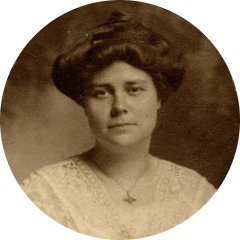Dorothy Olcott Elsmith
(1891–1984)
Dorothy Olcott Elsmith (1891–1984), friend of Emily Hale. Daughter of a mining and railroad tycoon, she grew up in Duluth, Minnesota, and studied at Smith College, Massachusetts, and at Columbia University (MA, 1917). In 1917 she married a medical researcher, Frederick Lamont Gates, and bore five children; but her husband died following a fall in his laboratory at Harvard University in 1933. In about 1934 she married a close friend named Leonard Elsmith. The Elsmiths owned an ocean-front home at Woods Hole, Falmouth, Massachusetts, on the southern elbow of Cape Cod, where EH and TSE stayed with the family in 1933, and again in 1936.
Lyndall Gordon, T. S. Eliot, 255; Imperfect Life, 249–50, has written of TSE’s visit to the Elsmiths in 1933: ‘In the midst of family, in a bookish city where Eliot was a celebrity, he and Emily Hale were less free than in California. Dorothy Elsmith, a friend who lived in Woods Hole, provided a retreat, as she recalled: “Emily and Mr Eliot made several visits to the anonymity of my home here [called Olcotage, or Ros Marinus], where they walked the beach, in quiet retreat from Cambridge publicity.”’
TSE wrote in Elsmith’s copy of Collected Poems:
Inscribed for Mrs. Elsmith
—By a grateful guest
——T. S. Eliot
Woods Hole Mass. 21 XI 36
Elsmith wrote an unpublished memoir of TSE, ‘Glimpses of the great’:
‘I recall one thoughtful gesture of the “grateful guest”. At the time, one of the boys was a student at Milton Academy. The first morning he [TSE] appeared at breakfast wearing a Milton tie, a graduate himself. Quiet, courteous, unobtrusive, he had a way, flattering to the person addressed, of stooping a little and focusing his attention of the moment on YOU. He seemed to enjoy the informal family routine of continuous buffet breakfasts, set up from 8 to 10, and tray suppers in front of the open fire when he and Emily came in from beach walks. The youngest child remembers his bringing her up her breakfast tray one morning when a cold kept her in bed’ (Young Library, Smith College).
TSE to Elsmith, 3 Oct. 1944: ‘I remember my visit to Woods Holl [sic] ever so clearly, and should like to be remembered to your family. You were extraordinarily kind and tactful: and it was a time, as you will remember, when Emily was going through something of a crisis, which gave what was happily unfounded anxiety. I know, from what she has said in letters, what a stay and support you have been to her in these years between’ (Houghton).
